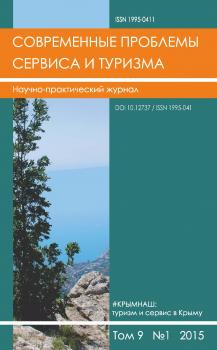The article presents the analysis of the involvement of the intangible cultural heritage of the Republic of Tatarstan in tourism. Tremendous opportunities in this regard offer the organization of tourist events on the basis of cultural events. Event tourism is today one of the most rapidly developing types of tourism, whose turnover has grown to billions of dollars. The leading tourism regions of Russia, as well as the provinces demonstrate the growing number and attractiveness of tourism eventsfrom the Olympics Games in Sochi to the festival of folk crafts «Vyatskiy Lapot» in Kirov region. Vast expanses of Russia, the variety of natural landscapes, national and religious traditions of the population, rich history creating the preconditions for an infinite number of variants of transformation of cultural heritage in colorful tourism events. The Republic of Tatarstan, being one of the most economically and socially developed regions in Russia, shows in recent years high rates of the tourism industry development. Due to major sporting and cultural events a modern tourism infra- structure has been created here – transport, hotel, information, etc. Great attention is paid to the development of event tourism in the Republic, beginning with the ancient national holidays of peoples of Tatarstan, ending with «newborn» festivals of Medieval weapons in Ancient Bolgar and gastronomic festival «Delicious Kazan». Not coincidentally, Kazan became a leader among cities of Russia by reception of foreign tourists, taking in the winter of 2016 the third place after the two capitals. The article focuses on evenrelated activities that have a significant potential to become a powerful tourist attractors for the Republic of Tatarstan.
intangible cultural heritage, event tourism, Republic of Tatarstan, national holidays, festivals of theater and cinema.
1. Zvyagina M.Yu. Development of event-related tourism for the purpose of retention of national traditions. Vestnik Rossijskogo novogo universiteta [Bulletin of the Russian New University], 2013, No.2, pp. 141-143. (In Russ.).
2. Klimova T.B., Vishnevskaya E.V., Stenyushkina S.G. Event as a unique tool of tourism development (experience of Belgorod region). Sovremennye problemy servisa i turizma [Service and Tourism: Current Challenges], 2015, vol.9, No.3, pp. 105-112. DOI:https://doi.org/10.12737/12889. (In Russ.).
3. Krotova E.L. Recreational and tourism complex of Volga region: theory and practice. Kazan: Ural Branch RAO, 2014. 180 p. (In Russ.).
4. Laiko M.Yu., Ilyina E.L., Latkin A.N. Research of mega-event tourism influence on touristic area development (on the example of European Championship Football Cup 2012). Sovremennye problemy servisa i turizma [Service and Tourism: Current Challenges], 2012, No.2, pp. 26-34. (In Russ.).
5. Mishulina S.I. The legacy of the 2014 Olympics: the development of tourist infrastructure. Sovremennye problemy servisa i turizma [Service and Tourism: Current Challenges], 2014, vol.8, No.4, pp. 75-87. DOI:https://doi.org/10.12737/6577. (In Russ.).
6. Mudarisov R.G., Kobitev A.D. The Tatar national cuisine in Kazan: gastronomic tourism. Sovremennye problemy servisa i turizma [Service and Tourism: Current Challenges], 2015, vol.9, No.4, pp. 95-103. DOI:https://doi.org/10.12737/14537. (In Russ.).
7. Rozanova L.N., Kulyagina N.G., Mustafina A.A. The role of tourism in the development of national artistic trades in the Republic of Tatarstan. Sovremennye problemy servisa i turizma [Service and Tourism: Current Challenges], 2015, vol.9, No.4, pp. 88-94. DOI:https://doi.org/10.12737/14536. (In Russ.).
8. Sokolova M.V. Tourism as a cultural phenomenon: morphological aspect. Sovremennye problemy servisa i turizma [Service and Tourism: Current Challenges], 2014, vol.8, No.4, pp. 10-19. DOI:https://doi.org/10.12737/6571. (In Russ.).





